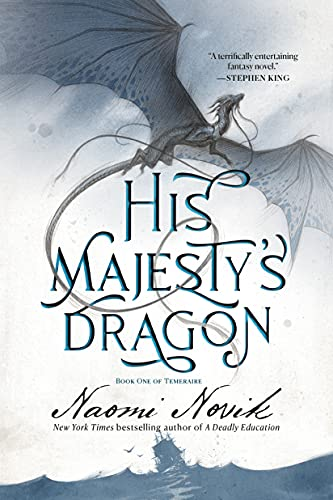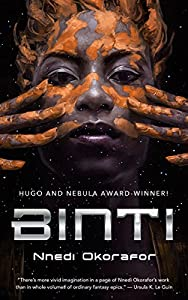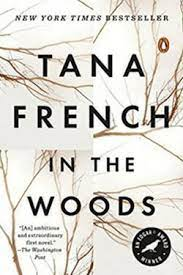Earned versus Unearned Endings
So, when discussing the Scholomance trilogy, I said that I put it way above Uprooted or the Temeraire series, the former because of a much superior ending and the latter because the Scholomance trilogy is massively more tightly plotted. Various of you pointed to Spinning Silver and said that was your favorite of Novik’s books until the Scholomance trilogy bumped it down to second place. That’s one I haven’t read, and after your various comments about it, now I’m much more interested in it. But I thought I’d go back to Uprooted and explain why I loved it the first time I read it, but love it a lot less now, and why that’s different (very, very different) from the Scholomance trilogy. Then maybe those of you who have read Spinning Silver can evaluate that one on this particular axis.
Now, first, I should say briefly, that I really loved the first book of the Temeraire series and had no problem suspending (major) disbelief in the (extreme) ecological implausibility of having significant populations of giant dragons all over the place, especially Great Britain.

The story carried me over that hump. I loved the book and I thought the ending was fine. Then in the second book, I got bored with the long, long, long trip to China. Then, in some later book, I got bored with the LONG, LONG, LONG trip across the Australian desert for what (as I recollect) was basically no purpose. After that I think I read one more book? But I wasn’t very invested and quit. The problems here had to do with plot threads going off in various directions until the action diffused out into a mist of long journeys interspersed with random things I don’t remember very well. That’s a huge contrast to the Scholomance trilogy, where you read the third book and everything pops into clearer and clearer focus as you go, all the plot threads weaving tightly together into one cohesive picture.
So that was a big and important difference.
But the problem I had with Uprooted was totally different from the problem I had with the later books of the Temeraire series.
I loved Uprooted while I was reading it, straight through to the end, which … I did not love. It was too neat. It was too happy.
Yes, I love happy endings. But.
Yes, I particularly love redemption arcs. BUT.
In Uprooted, when we saw the finale of the redemption arc, that redemption was unearned. The ending was unjust.
The evil forest was WAY too evil to just pat it on the head and say all was forgiven and let’s all be friends now. I don’t remember the details about how everyone got into that mess in the first place. The part I remember is that the evil forest did A LOT of REALLY DIRE AND HORRIBLE stuff to innocent people for a LONG TIME and then, poof! That’s okay though! It’s all right! Let’s all be friends!
The horrible things the forest did were actually not okay, not remotely okay. The full story novel did not seem, to me, to lead to forgiveness or redemption in a believable or just way.
I can think of a few other stories that did not work for me in this exact way: An unjust ending, or sometimes an unjust plot twist, ruined the story for me beyond any possible retrieval.
For example, this one, which was at least nominated for awards and maybe won, I don’t remember:

I had several problems with this story. I thought the protagonist’s voice sounded clinical rather than genuine, like an anthropologist telling a story she imagined someone might have lived rather than like someone living that life. Some other plot elements seemed peculiar and unbelievable. But the thing that absolutely ruined this story for me was that, well, sure, the meduse killed everyone on the ship except Binti, but that’s okay because … well, it’s all right because … I mean, really, you can’t blame the meduse because after all …
No. No, that is not okay with me. It wasn’t just that Binti finds this mass murder event okay, although that’s bad enough. Everyone else in the story also seems to shrug that off, and that was even worse. This plot twist was handled in a way that was deeply unjust. Could it have been fixed? Sure. Revamping the emotional reaction of the human characters would have done it even without changing a single thing about the plot. Writing Binti herself as a sociopath who doesn’t care a bit about other people would have fixed this problem, though it sure wouldn’t have made me like the story any better.
This one isn’t SFF, but:

You may recall that I loathed this book. It’s beautifully written, I’ll say that. But I hated the way the protagonist slowly destroyed his life over the course of the novel, I hated the way the author took a perfectly good nonsexual male-female friendship and turned it sexual and then ruined it, I hated the way the opening mystery is left totally unsolved, and I absolutely detested the ending, in which the bad guy gets away with vicious murder and walks away scott free. That is the quintessential unjust ending. This is the first book of what appears to be a six-book series, and for all I know the story may still be going, but I will never read the second book. I don’t care how the author handles anything whatsoever. I don’t care if the protagonist ever puts his life back together. I don’t care whether he recovers his friendship with the female colleagues. I don’t care about the initial mystery. I don’t even care whether the murderer is ever brought to justice. The ending of the first book means I’m never picking up another book in the series OR another book by the author.
And my real point in this context is that this unjust ending alone, even if everything else had been great, would almost certainly have ruined the book for me.
I pause to note that In the Woods was a NYT bestseller, I see. Well, whatever. We all know that very popular books can be absolutely horrible.
What other kinds of books have endings that are not exactly bad — not necessarily bad — but are handled in a way that may be unjust?
Well, there’s The Dark is Rising series by Susan Cooper. I have very fond memories of that series, and I bet most of you do as well. I read it many times. But (spoiler!) when half the characters wind up forgetting everything important at the end, that’s a problem. It’s a problem with fairness — the author is not being fair to those characters and therefore the author is not being fair to the reader. That’s a kind of unjust ending that makes readers throw the book across the room and shout.
Really, I do feel Susan Cooper ought to have realized that everyone was going to hate that aspect of the ending.
Here’s a different one which the author pulled off surprisingly successfully: Diplomatic Immunity by LMB. Here, Miles goes through all that and then, boom, he’s unconscious for the climax and half the denouement. Bujold can pull that off because (a) Ekaterin is a great character, and (b) Bujold is just that good a writer. But it’s unfair to Miles. It was also unnecessary. She could perfectly well have handled that part of the book differently. I don’t think there was any important advantage to the plot to handling it the way she did. In fact, it made the ending harder to write, not easier.
In contrast to all the above, sometimes the ending is particularly excellent, and excellent in a way that provides … I’m not sure how to put this … that provides a more just ending than the reader thought was possible. The reader sees defeat coming and of course trusts that the author will have the characters pull victory out of defeat, and that happens, but in a way that is surprising and also perfect for this particular story.
I am in fact thinking of the ending, and here I mean the climactic ending rather than the epilogue-style ending, of the Scholomance trilogy here. The solution fits perfectly into the metaphysics of the story and it’s also right for all the characters involved, not just El and Orion, but everyone. I appreciated the quiet epilogue-style ending too — I almost always love epilogues — but that wasn’t the part that involved a surprising and fitting and just solution to the problem.
Here’s another one: in the Demon’s Lexicon series by Sarah Rees Brennan — which is a fairly dark series, and very intense, by the way — but it’s also a great trilogy. It’s got a lot going for it, including tremendous characterization and amazing dialogue and good worldbuilding, but right at the moment I’m thinking about the ending. Jamie is an important character from the beginning of the trilogy, but moves to a role that’s very central to the plot in the third book, even though he’s not a pov character at that point. I’m going to provide a spoiler about the ending, but I’ll keep it vague.
The important thing in this context is that (a) we don’t see the solution coming; (b) it fits the characters, the metaphysics, and the situation; (c) it’s a better ending than the reader probably expects — better for the characters — better for the minor characters, not just the important characters — better for the bad guys too, a lot of them, because (here’s the spoiler!) Jamie pulls them over the the right side. There’s a redemption arc we don’t see coming, buried beneath everything else that’s going on. This is amazingly great and also it’s a just ending, an earned ending, one that doesn’t feel like oh, never mind, all is forgiven when really, it shouldn’t be.
One more: in David Brin’s The Uplift War, a lot is going on, a lot of it important for humans. But the central problem isn’t exactly about humans, it’s about partially uplifted gorillas. Everything is difficult and complicated and it’s impossible to see how anything can possibly work out. And then, boom, it DOES work out, in a way that fits the characters and the world. The gorillas make their own decision, which no one saw coming, and one of the important characters exclaims something like, “I worked so hard for this to happen and never even knew that was what I was working for!” The reader immediately sees that yes, that’s right, this is exactly what needed to happen, it’s what everyone would have been working for except they hadn’t thought of it. It’s also just what the reader wants to have happen, even though the reader doesn’t know that until it does happen. It’s unexpected, but exactly right.
All this reminds me of a term that Tolkien (I think?) coined — eucatastrophe. Yes, this post here indicates that Tolkien is the one who coined that term.
In essence, a eucatastrophe is a massive turn in fortune from a seemingly unconquerable situation to an unforseen victory, usually brought by grace rather than heroic effort. Such a turn is catastrophic in the sense of its breadth and surprise and positive in that a great evil or misfortune is averted.
Heroic effort or grace, either is fine with me. And of course many fine stories don’t quite reach this level with their various endings and they’re still good and still have good endings. But a novel that heads for a terrible ending and then the author delivers by fiat an unearned happy ending rather than an earned happy ending — that’s not just unsatisfying. It feels wrong. It doesn’t fit. It feels like cheating. In Uprooted specifically, it feels disconnected from the story, as though the story has depth, but the ending is facile and shallow. I’m not sure I’m expressing this as well as I’d like to, so I’ll go back to the term that seems to fit best to me: It feels unjust.
And it turns out that this is a big problem for me, bigger than I realized at the time. Over time, the ending of Uprooted bothered me more and more and this ended by coloring the whole story, which I now like much less than I did when I first read it. I re-read the book again, later, and finally figured out what the problem was, which I’m not sure I understood the first time I read it. I doubt I’ll ever re-read now.
So … I guess that’s a really long discussion about an important quality where a novel may succeed far better than expected or fail more profoundly than expected. But I think I’ll wind up bringing this back down to a simple question: How about Spinning Silver? If you’ve read it, how did you like the ending?
Please Feel Free to Share:






The post Earned versus Unearned Endings appeared first on Rachel Neumeier.



